准关系词as,than和but
- 格式:doc
- 大小:1.70 MB
- 文档页数:4
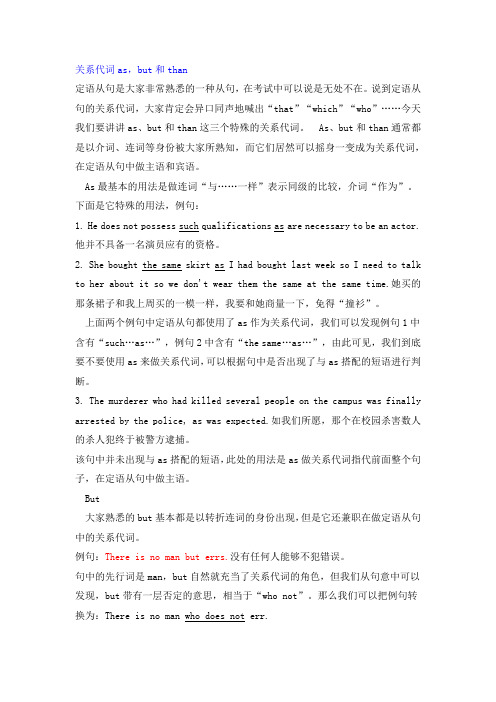
关系代词as,but和than定语从句是大家非常熟悉的一种从句,在考试中可以说是无处不在。
说到定语从句的关系代词,大家肯定会异口同声地喊出“that”“which”“who”……今天我们要讲讲as、but和than这三个特殊的关系代词。
As、but和than通常都是以介词、连词等身份被大家所熟知,而它们居然可以摇身一变成为关系代词,在定语从句中做主语和宾语。
As最基本的用法是做连词“与……一样”表示同级的比较,介词“作为”。
下面是它特殊的用法,例句:1. He does not possess such qualifications as are necessary to be an actor.他并不具备一名演员应有的资格。
2. She bought the same skirt as I had bought last week so I need to talk to her about it so we don't wear them the same at the same time.她买的那条裙子和我上周买的一模一样,我要和她商量一下,免得“撞衫”。
上面两个例句中定语从句都使用了as作为关系代词,我们可以发现例句1中含有“such…as…”,例句2中含有“the same…as…”,由此可见,我们到底要不要使用as来做关系代词,可以根据句中是否出现了与as搭配的短语进行判断。
3. The murderer who had killed several people on the campus was finally arrested by the police, as was expected.如我们所愿,那个在校园杀害数人的杀人犯终于被警方逮捕。
该句中并未出现与as搭配的短语,此处的用法是as做关系代词指代前面整个句子,在定语从句中做主语。
But大家熟悉的but基本都是以转折连词的身份出现,但是它还兼职在做定语从句中的关系代词。
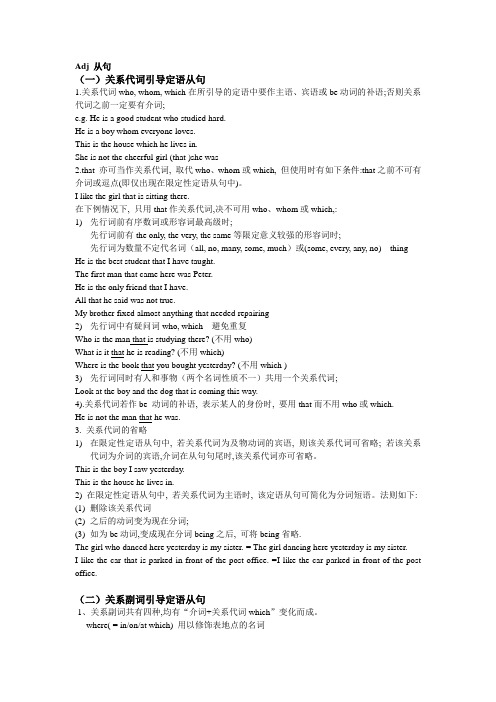
Adj 从句(一)关系代词引导定语从句1.关系代词who, whom, which在所引导的定语中要作主语、宾语或be动词的补语;否则关系代词之前一定要有介词;e.g. He is a good student who studied hard.He is a boy whom everyone loves.This is the house which he lives in.She is not the cheerful girl (that )she was2.that 亦可当作关系代词, 取代who、whom或which, 但使用时有如下条件:that之前不可有介词或逗点(即仅出现在限定性定语从句中)。
I like the girl that is sitting there.在下例情况下, 只用that作关系代词,决不可用who、whom或which,:1)先行词前有序数词或形容词最高级时;先行词前有the only, the very, the same等限定意义较强的形容词时;先行词为数量不定代名词(all, no, many, some, much)或(some, every, any, no)---thing He is the best student that I have taught.The first man that came here was Peter.He is the only friend that I have.All that he said was not true.My brother fixed almost anything that needed repairing2)先行词中有疑问词who, which---避免重复Who is the man that is studying there? (不用who)What is it that he is reading? (不用which)Where is the book that you bought yesterday? (不用which )3)先行词同时有人和事物(两个名词性质不一)共用一个关系代词;Look at the boy and the dog that is coming this way.4).关系代词若作be 动词的补语, 表示某人的身份时, 要用that而不用who或which.He is not the man that he was.3. 关系代词的省略1)在限定性定语从句中, 若关系代词为及物动词的宾语, 则该关系代词可省略; 若该关系代词为介词的宾语,介词在从句句尾时,该关系代词亦可省略。

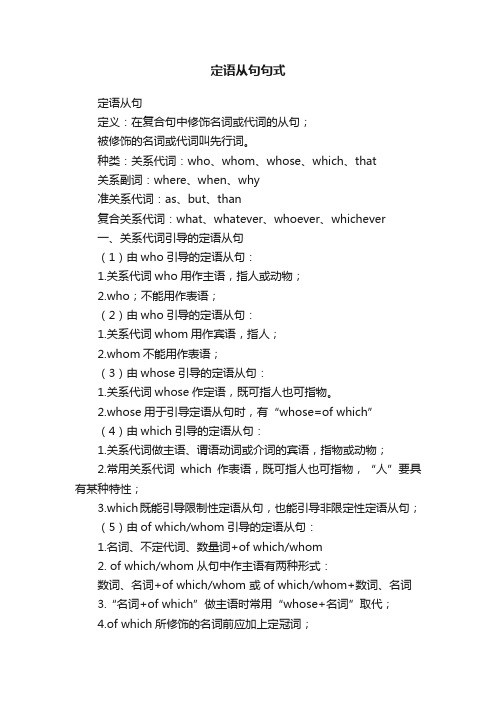
定语从句句式定语从句定义:在复合句中修饰名词或代词的从句;被修饰的名词或代词叫先行词。
种类:关系代词:who、whom、whose、which、that关系副词:where、when、why准关系代词:as、but、than复合关系代词:what、whatever、whoever、whichever一、关系代词引导的定语从句(1)由who引导的定语从句:1.关系代词who用作主语,指人或动物;2.who;不能用作表语;(2)由who引导的定语从句:1.关系代词whom用作宾语,指人;2.whom不能用作表语;(3)由whose引导的定语从句:1.关系代词whose作定语,既可指人也可指物。
2.whose用于引导定语从句时,有“whose=of which”(4)由which引导的定语从句:1.关系代词做主语、谓语动词或介词的宾语,指物或动物;2.常用关系代词which作表语,既可指人也可指物,“人”要具有某种特性;3.which既能引导限制性定语从句,也能引导非限定性定语从句;(5)由of which/whom引导的定语从句:1.名词、不定代词、数量词+of which/whom2. of which/whom从句中作主语有两种形式:数词、名词+of which/whom 或of which/whom+数词、名词3.“名词+of which”做主语时常用“whose+名词”取代;4.of which所修饰的名词前应加上定冠词;(6)由介词+which+抽象名词引导的定语从句:1.在非限制性定语从句中,以“介词+which+抽象名词”结构补充说明,which作定语;2.the way后接定语有三种形式:不加;加that;加in which;(7)由that引导的定语从句:1.关系代词that在从句中作主语或宾语,不作介词宾语,既指人也指物;2.先行词是不定代词时,必须用that引导定语从句;3.先行词被不定代词修饰时,必须用that引导定语从句;4.先行词被序数词或形容词最高级修饰时,必须用that引导定语从句;5. 先行词既有人又有物时,必须用that引导定语从句;6. 先行词被the only、the same、the last修饰时,必须用that 引导定语从句;7.以who、which引起的问句中,为避免重复,常用that引导定语从句;8.用作关系副词以修饰表示时间的名词时,常用that代替when 引导定语从句;9.构成非限制性定语从句时,不用that;10关系代词前有介词且指物时,不用that;11.先行词本身是that时,不用that;12.关系代词之后有插入成分时,不用that;二、关系副词引导的定语从句(1)由when的定语从句:1.关系副词when是兼有连词作用的副词,常用于表示时间;2.先行词为表示时间的名词;3在口语中,先行词为表示时间的名词时,可以省略when;4先行词在从句中起副词作用作时间状语时,用when引导定语从句;先行词在从句中起代词作用作宾语时,用which/that引导定语从5.在this/that/it’s后可省略先行词the time;6.现代英语口语中,the day when、the time when、the moment when可用that代替;;7.关系副词when可用恰当的“介词+which”代替;(2)由where引导的定语从句:1. 关系副词where是兼有连词作用的副词,常用于表示地点;2.先行词为表地点或有地点含义的抽象名词;3.在口语中,先行词是place、room等词时,可以省略where;4.先行词在从句中起副词作用作地点状语时,用where引导定语从句;先行词在从句中起代词作用作宾语时,用that/which引导定语从句;5. 在this/that/it’s后可省略先行词the place;6. 现代英语口语中,the place where可用the place that代替;7. 关系副词where可用恰当的“介词+which”代替;(3)由why引导的定语从句:1. 关系副词why兼有连词作用的副词,常用于表示原因;2.先行词只有reason;3.在口语中,可以省略why;4.先行词reason在从句中起副词作用表原因时,用why引导定语从句;先行词reason在从句中起代词作用作宾语时,用that/which引导定语从句;5.在this/that/it’s后可省略先行词the reason;6.现代英语口语中,the reason why可用the reason that代替;7. 关系副词why可用恰当的“介词+which”代替;(4)由介词+where/when引导的定语从句:1.from where引导的定语从句中,where代表主句提供的地点;2.since/by when引导的定语从句中,when代表主句提供的时间三、准关系代词引导的定语从句(1)由准关系代词as引导的限制性定语从句:1.as既可作引导状语从句的连词,也可作引导定语从句的关系代词;2.在such…as引导的定语从句中,as在从句中作主语或表语;3.在the same…as引导的定语从句中,as在从句中作主语或宾语;4.在as…as引导的定语从句中,as在从句中作主语;5.区别:such…as引导定语从句,such…that引导结果状语从句;6.区别:the same…as指两物相似,the same…that描述的是同一物;(2)由准关系代词as引导的非限制性定语从句:1.as代表主句或主句一部分的意思,不能指代某个名词或代词;2.在as引导的非限制性定语从句中,as可以放在主句的任意位置,在从句中作主语或宾语;3.主句表否定,as引导的定语从句位于主句之后时,as指代的主句不表否定,可用but代替;4.主句表否定,as引导的定语从句位于主句之前时,as指代的主句仍表否定意义;5非限制性定语从句中,which引导的从句不能放在主句前,as 引导的从句可放在主句前后.;6.非限制性定语从句中,as/which用作关系代词时都可指代一个句子,但as有“就像”之意;7.非限制性定语从句中,当从句的谓语动词时be动词或连系动词时,as/which都可作主语;8.非限制性定语从句中,当从句的谓语动词是行为动词时,只能用which作主语;9.非限制性定语从句中,as可作连词引导状语从句,构成“as+过去分词”形式,表定语义;(3)由准关系代词but引导的定语从句:1.but本身含有否定义,相当于who/which/that…not;2.but的先行词往往是有否定义的代词或名词词组,通过双重否定表强烈肯定;3.but用于定语从句中作主语,此时谓语动词的数要与先行词一致,时态要与主句一致;4.but用于引导状语从句时,有“but=that...not”(4)由准关系代词than引导的定语从句:1.than引导的定语从句中,谓语动词的数和时态必须与被比较级修饰的先行词一致;2.than引导的状语从句中,用作连词的than可兼作关系代词在主句中作主语,than指代主句;3.than引导的状语从句中,构成“than+过去分词”结构,than 后省略了形式主语it、动词be;四、复合关系代词引导的定语从句(1)复合关系代词what引导的定语从句:1.定语从句中,what是由先行词和关系代词组成的复合词,是兼作先行词的关系代词;2.what用于指人时,what=the person that;what用于指物时,what=the thing(s) which;3.what在定语从句中起名词作用时,可作主语、宾语、表语;4.what在定语从句中起形容词作用时,修饰名词,意为“仅有的”;5.what在定语从句中起形容词作用时,常与few、little连用,意为“尽管不多,但已全部”;6.what引导的名词性从句中,无疑问义,可作从句的主语、宾语、介宾、宾补;7.what用于表比喻义的特殊结构:A is to B what C is to D;8.what组成的常用短语:What if…? 如果…怎么样?What of it?那又怎么样?(2)复合关系代词whoever,whomever,whichever,whatever引导的定语从句:1.whoever、whomever、whichever、whatever具有名词功能,引导名词性从句;2.whoever、whomever、whichever、whatever指代未知的人或物,在从句中作主语或宾语;3.whichever、whatever在名词性从句中兼起形容词作用,修饰从句中名词,意为“仅有的”;4. whoever、whichever、whatever在名词性从句中兼起副词作用,引导让步状语从句;五、关系代词的省略1.当关系代词在定语从句中作宾语时往往省略;2.当关系代词在定语从句中作表语时,用that且往往省略;3.当先行词为不定代词时,往往不用关系代词;4.当定语从句为there be句型时,往往不用关系代词;5.当主句为there be句型时,实际主语后若带有定语从句,作主语的关系代词有时省略;六、插入语(1)分句用作插入语:I believe、I find、I hear、I imagine、I remember、I think、I sup pose…(2)状语分句作插入语:1.可作插入语的状语分句有:as far as I know、as I told you before、if you like…2.省略形式的状语分句作插入语:if ever、if possible、if any…(3)what构成的惯用插入语:1.“what+be+比较级形容词”结构,意为“而且,尤有甚者“;2.“what we call,what is called”,意为“所谓的”;3.“what+…”的类似结构:what we consider、what you refer to as、what is referred to as…例句:This is the man who helped me.(who在从句中作主语)The doctor whom you are looking for is in the room.(whom 在从句中作宾语)Do you see the house whose windows are all broken?(whose在从句中作定语)The building which stands near the river is our school.(which在从句中作主语)This is the book (which) you want.(which在从句中作谓语动词的宾语)The room in which there is a machine is a workshop.(which 在从句中作介宾)The war killed 1000 people, most of which were very young.(“不定代词+of which”的形式)The committee consists of 20 members, five of whom are women.(“数量词+of whom”的形式)Do you see the house the windows of which are all broken?(“名词+of which”作主语结构之一)Do you see the house of which the windows are all broken? (“名词+of which”作主语结构之二)It rained all night, during which time the ship broke in pieces.(“介词+which+抽象名词”结构)That’s the way (/) he spoke.(the way后接定语的形式之一)That’s the way that he did it. (the way后接定语的形式之二) That’s the way in which you answered the question. (the way后接定语的形式之三)。
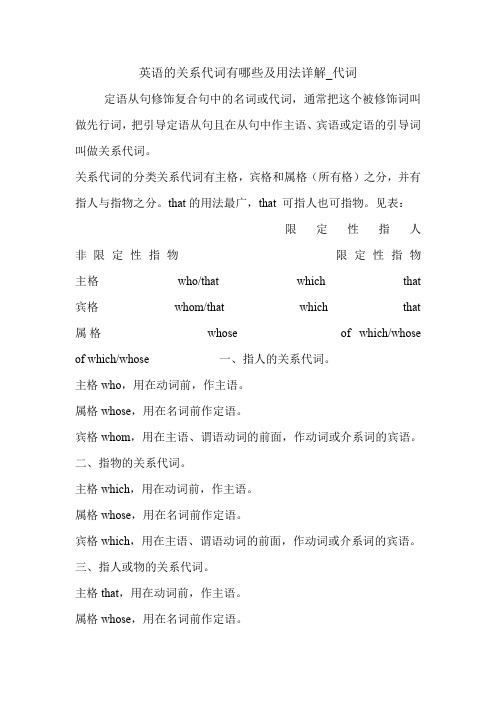
英语的关系代词有哪些及用法详解_代词定语从句修饰复合句中的名词或代词,通常把这个被修饰词叫做先行词,把引导定语从句且在从句中作主语、宾语或定语的引导词叫做关系代词。
关系代词的分类关系代词有主格,宾格和属格(所有格)之分,并有指人与指物之分。
that的用法最广,that 可指人也可指物。
见表:限定性指人非限定性指物限定性指物主格who/that which that 宾格whom/that which that 属格whose of which/whose of which/whose 一、指人的关系代词。
主格who,用在动词前,作主语。
属格whose,用在名词前作定语。
宾格whom,用在主语、谓语动词的前面,作动词或介系词的宾语。
二、指物的关系代词。
主格which,用在动词前,作主语。
属格whose,用在名词前作定语。
宾格which,用在主语、谓语动词的前面,作动词或介系词的宾语。
三、指人或物的关系代词。
主格that,用在动词前,作主语。
属格whose,用在名词前作定语。
宾格that,用在主语、谓语动词的前面,作动词或介系词的宾语。
四、其它关系代词。
but,as,than作关系代词引导定语从句but既可指人,也可指物,常在定语从句中充当主语。
but本身含否定的意思,其作用相当于that /which /who...not。
它前面的主句通常有否定的词(如:no,not,little,few,hardly等)。
but引导的肯定定语从句和否定的主句连用,达到强烈肯定的修饰效果。
例如:There is no mother but loves her own children.(=There is no mother that/who does not love her own children.)没有不爱自己孩子的母亲。
as既可指人,也可指物,常在限制性定语从句中充当主、宾、表语。
as引导的定语从句的先行词前面常有as /such /the same等修饰词。

三个特殊关系代词的用法but,as,than作关系代词引导定语从句but既可指人,也可指物,常在定语从句中充当主语。
but本身含"否定"的意思,其作用相当于"that /which /who...not"。
它前面的主句通常有"否定"的词(如:no,not,little,few,hardly等)。
but引导的肯定定语从句和否定的主句连用,达到强烈肯定的修饰效果。
例如:There is no mother but loves her own children.(=There is no mother that/who does not love her own children.)没有不爱自己孩子的母亲。
as既可指人,也可指物,常在限制性定语从句中充当主、宾、表语。
as引导的定语从句的先行词前面常有as /such /the same等修饰词。
例如:①He is as brave a man as ever lived.他是世界上最勇敢的人。
②Don’t read such books as are not worth reading.不要读那些不值得读的书。
as作关系代词,还可用来引导非限制性定语从句,as引导的定语从句可放在句首、句中或句末。
例如:①Taiwan,as we all know,is an inseparable part of China.②As we all know,Taiwan is an inseparable part of China.③Taiwan is an inseparable part of China,as we all know.than既可指人,也可指物,可作关系代词来引导定语从句。
than前通常有表比较的词。
例如:Fewer friends than we had expected came to our evening party.来参加晚会的朋友比我们预料的还要少。
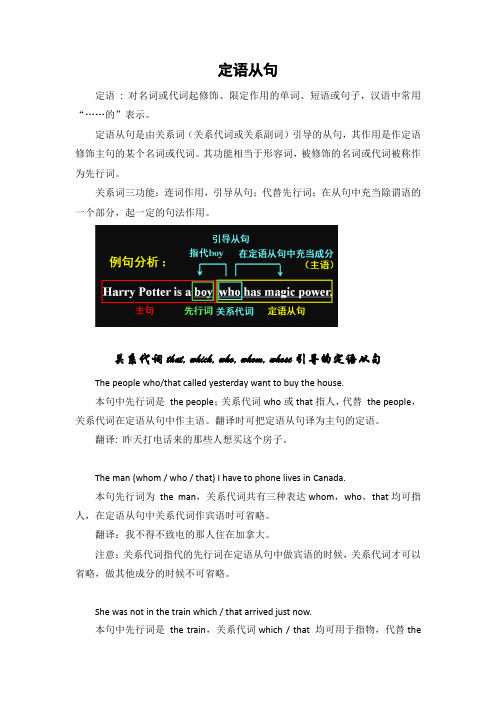
定语从句定语: 对名词或代词起修饰、限定作用的单词、短语或句子,汉语中常用“……的”表示。
定语从句是由关系词(关系代词或关系副词)引导的从句,其作用是作定语修饰主句的某个名词或代词。
其功能相当于形容词,被修饰的名词或代词被称作为先行词。
关系词三功能:连词作用,引导从句;代替先行词;在从句中充当除谓语的一个部分,起一定的句法作用。
关系代词that, which, who, whom, whose引导的定语从句The people who/that called yesterday want to buy the house.本句中先行词是the people;关系代词who或that指人,代替the people,关系代词在定语从句中作主语。
翻译时可把定语从句译为主句的定语。
翻译: 昨天打电话来的那些人想买这个房子。
The man (whom / who / that) I have to phone lives in Canada.本句先行词为the man,关系代词共有三种表达whom,who,that均可指人,在定语从句中关系代词作宾语时可省略。
翻译:我不得不致电的那人住在加拿大。
注意:关系代词指代的先行词在定语从句中做宾语的时候,关系代词才可以省略,做其他成分的时候不可省略。
She was not in the train which / that arrived just now.本句中先行词是the train,关系代词which / that 均可用于指物,代替thetrain,关系代词在定语从句中作主语。
翻译:她不在刚刚到的那列火车上。
This is the book (which / that) you wanted.本句中先行词为the book,关系代词that / which指物,代替the book,关系代词在定语从句中作宾语,可省略。
翻译:这就是你想要的那本书。
I live next door to a couple whose children often make a lot of noise.We live in a house whose window opens to the south.whose既可以指人,也可以指物。
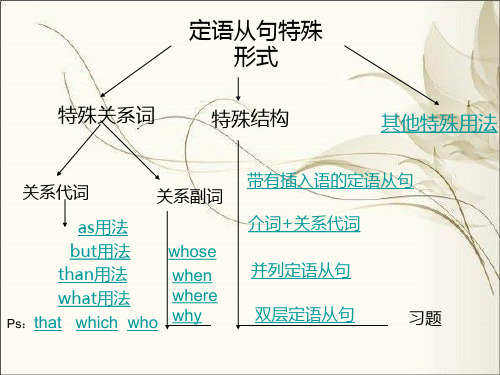
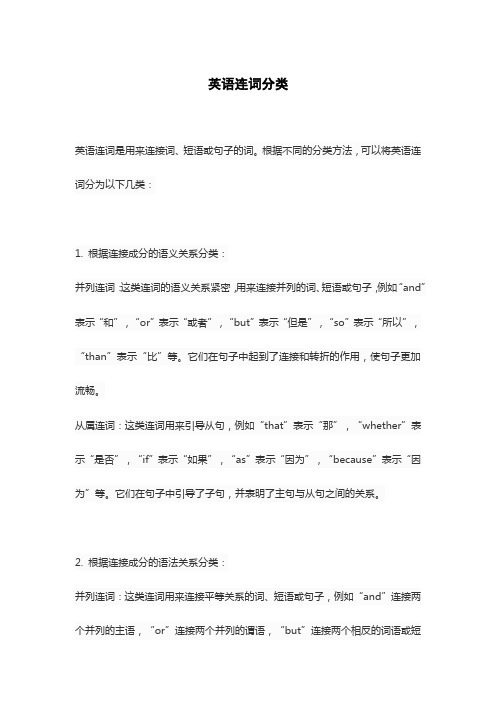
英语连词分类英语连词是用来连接词、短语或句子的词。
根据不同的分类方法,可以将英语连词分为以下几类:1. 根据连接成分的语义关系分类:并列连词:这类连词的语义关系紧密,用来连接并列的词、短语或句子,例如“and”表示“和”,“or”表示“或者”,“but”表示“但是”,“so”表示“所以”,“than”表示“比”等。
它们在句子中起到了连接和转折的作用,使句子更加流畅。
从属连词:这类连词用来引导从句,例如“that”表示“那”,“whether”表示“是否”,“if”表示“如果”,“as”表示“因为”,“because”表示“因为”等。
它们在句子中引导了子句,并表明了主句与从句之间的关系。
2. 根据连接成分的语法关系分类:并列连词:这类连词用来连接平等关系的词、短语或句子,例如“and”连接两个并列的主语,“or”连接两个并列的谓语,“but”连接两个相反的词语或短语,“then”连接两个并列的句子等。
它们在句子中形成了平等的关系,增强了句子的表现力。
从属连词:这类连词用来引导从句,例如“that”引导一个名词性从句,“whether”引导一个宾语从句,“if”引导一个条件状语从句,“as”引导一个原因状语从句等。
它们在句子中引导了子句,使主句与从句之间建立了从属关系。
3. 根据连词的来源分类:原生连词:这类连词是英语固有的,例如“and”、“or”、“but”、“if”等。
它们在英语中有着悠久的历史渊源,是英语表达中不可或缺的一部分。
外来连词:这类连词是从其他语言借来的,例如“deshalb”(德语)、“donc”(法语)等。
它们在英语中的使用可能是由于历史、文化或语言接触的原因。

浅谈but和than引导的定语从句在初级英语阶段,学生知道引导定语从句的关系代词有who (whom, whose),that和which等。
到了中高级阶段,这些显然是不够的。
还应了解but和than也可以用作关系代词的情况,以拓宽知识面,提高语言识别和理解能力。
1.but在英语句子中可用作关系代词,引导定语从句。
但应特别注意but虽然形式上是肯定的,意义上却是否定的。
这正是but和其它关系代词(who, that , which等)不同之处。
例如:(1)There is no rule in English but has exceptions.英语中没有无例外的规则。
(2)There is no old habit but may be cured by a strong will-power.通过强大的意志力没有改不了的旧习惯。
(3)With the introduction of the electronic computer, there is no complicated problem but can be solved in a few hours.由于引进了电子计算机,没有在几小时内解决不了的复杂问题。
(4)There is no human being but errs.没有不犯错误的人。
如果将以上例句(1)、(2)和(3)中的关系代词but改成that,或者将例句(4)中的关系代词but 改成that或who,那么定语从句必须改成否定从句才能与原句意义相一致。
例如:(5)There is no rule in English that has no exceptions/ that has not any exceptions.(6)There is no old habit that may not be cured by a strong will-power.(7)With the introduction of the electronic computer, there is no complicated problem that cannot be solved in a few hours.(8)There is no human being that(who)makes no mistakes/that(who)does not makes any mistakes. 【注意】如果(5)、(6)、(7)、(8)中没有明确的否定词no或not any等,其意义则完全相反。

特殊关系代词的用法:关系词通常是用来引导定语从句的,但as,than和but这三个词却与which, who, that, where, when和why等典型的关系词不同。
三者本身具有常见的字面意义,前面有名词作先行词,但后面的定语从句却不像典型的定语从句。
这些既像连接词又像关系词的词,我们就姑且称它们为准关系词。
一、as作为准关系代词出现在the same ... as, such ... as, 和as ... as等结构中。
这时, as前面通常要有名词;as后面的从句意义上不像是通常的定语从句;as需要在从句中充当一定的句子成分。
1. the same ... as1) as在从句中作主语She is the same person as came here last Sunday. 她就是上星期天来这儿的那个人。
2) as在从句中作宾语This is the same watch as I lost while I was doing the sightseeing in Shanghai three months ago. 这块表跟我三个月前在上海观光时丢失的那块一样。
3) as在从句中作be动词的表语China is not the same country as it used to be. 中国已今非昔比。
4) as在从句中作行为方式状语You should learn to do housework in the same way as your mother does it. 你应该学会像你母亲那样做家务活。
2. such ... as1) as在从句中作主语Let children read such books as tend to make them better and brighter. 让孩子看那些容易让他们变得更好更聪明的书。
2) as在从句中作宾语This is not such an interesting book as you just talked about. 这不是你们刚才谈到的那种有趣的书。
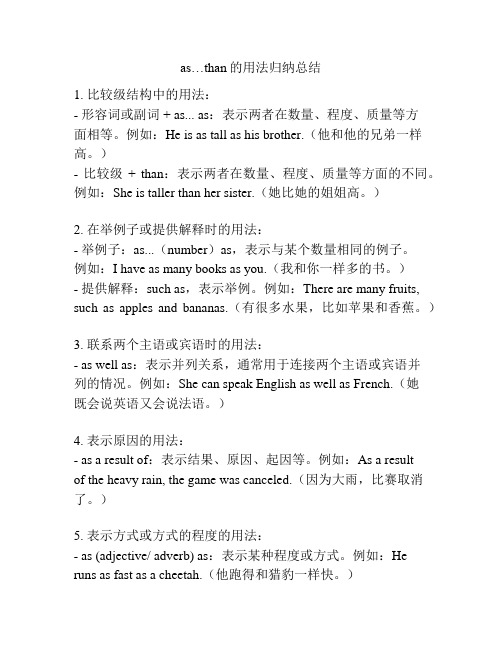
as…than的用法归纳总结1. 比较级结构中的用法:- 形容词或副词 + as... as:表示两者在数量、程度、质量等方面相等。
例如:He is as tall as his brother.(他和他的兄弟一样高。
)- 比较级+ than:表示两者在数量、程度、质量等方面的不同。
例如:She is taller than her sister.(她比她的姐姐高。
)2. 在举例子或提供解释时的用法:- 举例子:as...(number)as,表示与某个数量相同的例子。
例如:I have as many books as you.(我和你一样多的书。
)- 提供解释:such as,表示举例。
例如:There are many fruits, such as apples and bananas.(有很多水果,比如苹果和香蕉。
)3. 联系两个主语或宾语时的用法:- as well as:表示并列关系,通常用于连接两个主语或宾语并列的情况。
例如:She can speak English as well as French.(她既会说英语又会说法语。
)4. 表示原因的用法:- as a result of:表示结果、原因、起因等。
例如:As a resultof the heavy rain, the game was canceled.(因为大雨,比赛取消了。
)5. 表示方式或方式的程度的用法:- as (adjective/ adverb) as:表示某种程度或方式。
例如:He runs as fast as a cheetah.(他跑得和猎豹一样快。
)。
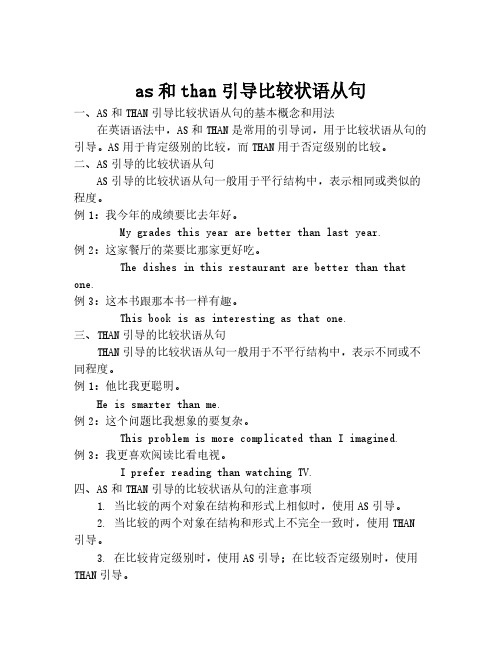
as和than引导比较状语从句一、AS和THAN引导比较状语从句的基本概念和用法在英语语法中,AS和THAN是常用的引导词,用于比较状语从句的引导。
AS用于肯定级别的比较,而THAN用于否定级别的比较。
二、AS引导的比较状语从句AS引导的比较状语从句一般用于平行结构中,表示相同或类似的程度。
例1:我今年的成绩要比去年好。
My grades this year are better than last year.例2:这家餐厅的菜要比那家更好吃。
The dishes in this restaurant are better than that one.例3:这本书跟那本书一样有趣。
This book is as interesting as that one.三、THAN引导的比较状语从句THAN引导的比较状语从句一般用于不平行结构中,表示不同或不同程度。
例1:他比我更聪明。
He is smarter than me.例2:这个问题比我想象的要复杂。
This problem is more complicated than I imagined.例3:我更喜欢阅读比看电视。
I prefer reading than watching TV.四、AS和THAN引导的比较状语从句的注意事项1. 当比较的两个对象在结构和形式上相似时,使用AS引导。
2. 当比较的两个对象在结构和形式上不完全一致时,使用THAN 引导。
3. 在比较肯定级别时,使用AS引导;在比较否定级别时,使用THAN引导。
4. 在比较中,需要注意主谓一致和形容词或副词的形式变化。
在写作或口语表达中,准确使用AS和THAN引导的比较状语从句能够丰富句子结构,使语言更加准确、生动。
正确理解和运用这两个词的用法,是提高英语表达能力的重要一环。
以上为《AS和THAN引导比较状语从句》的文档内容,希望能满足您的需求并达到要求。

英语常用连词及其连接关系英语中的连词在句子中起到连接各个句子成分的作用,帮助表达句子之间的关系。
在使用连词时,需要了解各个连词的具体含义以及它们所连接的句子之间的关系。
本文将介绍一些常用的英语连词及其连接关系。
1. 并列连词并列连词用于连接并列的词、短语、从句或句子,常见的并列连词有"and"、"but"、"or"、"so"等。
"and"表示并列关系,用于连接同类的词、短语或句子。
例如:- I like to read books and watch movies.(我喜欢读书和看电影。
)"but"表示转折关系,用于连接两个相对矛盾的句子。
例如:- She is smart, but sometimes she can be a bit lazy.(她很聪明,但有时候有点懒散。
)"or"表示选择关系,用于连接两个或多个选择项。
例如:- Would you like coffee or tea?(你想要咖啡还是茶?)"so"表示因果关系,用于连接原因和结果。
例如:- It was raining, so we stayed at home.2. 因果连词因果连词用于表示因果关系,常见的因果连词有"because"、"since"、"as"等。
"because"引导原因状语从句,表示原因。
例如:- I couldn't go out because it was raining heavily.(我无法出去,因为下大雨。
)"since"也表示原因,常用于口语中,可以替代"because"。
例如:- Since it's your birthday, I bought you a present.(既然是你的生日,我给你买了个礼物。
![英语逻辑关系词[整理版]](https://img.taocdn.com/s1/m/9bae19d109a1284ac850ad02de80d4d8d15a01c1.png)
●转折关系but, however, yet(然而), on the contrary, contrary to, contrarily, by(in) contrast (to), whereas, rather than, instead of, unlike, in fact(effect), actually弱转, conversely●让步关系although, much as, though, even though(if), even,despite, in spite of, nevertheless, anyhow(anyway), as, while(虽然、尽管、即使), still(尽管如此)●总分关系(举例&总结)举例:for example、for instance、such as、including总结:in sum,in general, overall, to sum up,on the whole, generally●因果关系becausein that+句子表原因due tothanks toowing to+名词表原因sincenow thatever since +句子表原因because ofon account ofin response to+名词表原因lead tocontribute toresult in+名词(前因后果)so thatsuch thatin order that+句子(强调目的、结果的因果)in view ofin the light ofby virtue of +名词鉴于、由于put down toascribe toattribute toowe to +名词归因于sothushencethereforeconsequently (as a consequence/ as a result) +句子(因此)for, as, as a result of, with(由于,由于某种条件或原因的存在出现了某种结果)●递进关系递进词:still、also、indeed、furthermore(进一步)、moreover(而且、此外)、highlighting (突出、强调)、even(甚至、更)、besides(注意区分except), additionally, in addition, what’s more●条件关系连词:if, provided/providing that, suppose, supposing, in case (of), in the event of, assume, presumably, so long as, unless, only if, when●并列关系并列词:and(和)、as well as(也)、likewise(同样的)、while(与此同时)、similarly (类似地)、or(或者)、simultaneously(同时发生地)、meanwhile(同时)、in the meantime、neither…nor, either…or, not only…but also、more…thangains were substantial.l) A new security system was installed. In addition, extra guards were hired.m) The company provides cheap Internet access. In addition, it makes shareware freely available.n) The tax only affects people on incomes over $200, 000—in other words, the very rich. o) The clams were delicious. Likewise, the eggplant was excellent.p) Using language is a very complex enterprise. Moreover, there is more to communication than merely putting sentences together.q) The system was not only complicated but also ineffective.r) The cost of food and clothing has come down in recent years. Similarly, fuel prices have fallen quite considerably.s) Money makes money. To put it another way, the more you invest, the greater your potential pro fit will be.t) The problem demands a global solution. To put it another way, local regulations will have very little effect.u) First you need to collect all the information and make detailed notes. Then you can start to act ually write your essay.v) Think about what you owe, too, in terms of mortgages, credit cards, loans or hire purchase. w) Gas is a very efficient fuel. And what' s more, it's clean. 3.表示强调above all, anyway, as a matter of fact, certainly, indeed, in fact, in particular, most important, obv iously, of course, surely, to be sure, truly, undoubtedly, without doubta) Although it is somewhat limited in its applications it is easy to operate and above all it is fun.b) He got lost and spent hours looking for the station, and anyway it was past midnight by the tim e he got home.c) And, as a matter of fact, the U. S. Golf Association was delighted. d) Books and people certa inly affected him. e) Most of the essays were very good indeed.f) Her teachers said she was a slow learner, whereas in fact she was partially deaf. g) Automobi le prices in particular have fallen in recent months.h) But the reverse is true when an attorney represents a person who is obviously guilty or whose guilt is widely perceived.i) This is very obviously the approach of some one writing exclusively and specifically for the yo ung.j) Of course there will be some difficult times ahead.k) If a sign were needed that the Internet has become a real market, the arrival of tax avoidance is surely it.l) Throwing money at the problem is surely not the way to convince people of sincerity. m) It w as difficult, to be sure, but somehow we managed to finish the job.n) If we truly believe we can win, then we have a very good chance at doing it. o) Undoubtedly , public interest in folk music has declined.p) Sally was without doubt one of the finest swimmers in the school.10.表示顺序and, besides, finally, first, firstly, further, in the first place, last, next, second, secondly, third, thir dly, to begin with, to start with,a) It also assigned staff people to work with individual companies that wanted to launch a progra m.b) This is a flexible and user-friendly system suitable for beginners and advanced users alike. c) Y ou need to know what tights you have and how to use them.d) Besides going to aerobics twice a week, she tides horses on Saturdays. e) And finally, I' d like to thank the crew. f) First, I'd like to thank everyone for coming.g) The application of the five stages to the task illustrated would involve, firstly, the definition of the task.h) It is possible to make good movies cheaply. Further, "low-budget" doesn't have to mean "bad. "i) And there i. s the question of the relevance of the trading of information in the first place. j) Connect the red wires first and the black ones last.k) First you need to select the text you want to move. Next, click on the "Move" command at the top of the screen.l) But, second, in the vast majority of markets, efficient production can be attained with a high de gree of competition.m) The more you practise the better you will become at selecting historical information to suit fir stly your essay and secondly your argument.n) To begin with, much of this new housing is not affordable.o) I' m not going to V egas. To start with, I don' t like gambling, and I also can' t get time off work .3、观点转折,反面论证 4.表示对比或对照by contrast, but, conversely, in contrast, instead, on the contrary, on the other hand, otherwise, un like, whereas, while, yeta) The birth rate for older women has declined, but, by contrast, births to teenage mothers have in creased.b) The purpose of the scheme is not to help the employers but to provide work for young people.c) American consumers prefer white eggs; conversely, British buyers like brown eggs.d) Scandinavian cruises are very popular in the summer; conversely, the Carib bean is most popul ar in the winter.e) The stock lost 60 cents a share, in contrast to last year, when it gained 21 cents. f) Instead of being annoyed, he seemed quite pleased.g) It wasn't a good thing; on the contrary it was a huge mistake.h) Nuclear power is relatively cheap. On the other hand, you could argue that it's not safe. i) It i s equally vital that both should be mentioned, otherwise a client, particularly a buyer, could be seri ously misled.j) Unlike most people in the office, I don't come to work by car.k) A bowl of instant oatmeal costs about $1. 5, whereas regular oatmeal costs only $0. 5 perbowl.l) The old system was fairly complicated whereas the new system is really very simple.m) Schools in the north tend to be better equipped, while those in the south are relatively poor. n) Last summer there was a drought, yet some people were still watering their lawns every day.5.表示比较by comparison, equally, equally important, in comparison, in the same way, in the same manner, l ike, likewise, similarlya) After months of living in a tropical climate, Spain seemed cool by comparison. b) By compa rison with other European countries, car prices in the UK are very high.c) Even when the correct word was given a high probability, there were many other words with a n equally high probability.d) Many business people do not know what sexual harassment is. Equally important, they do not know how to prevent it.e) an extremely unpleasant disease which is, however, easy to treatf) Cotton production was on the increase. However, it was still a small industry compared to hem p and canvas production.g) The deaf children of hearing parents are almost normal in comparison, having everything exce pt language experience.h) There is often stronger social control evident in the socialisation of girls in comparison to boys .i) Good management accounts separate the well-organised from the rest but are not vital in the sa me way.j) I don't want him treating me like Jim treated me.k) The clams were delicious. Likewise, the eggplant was excellent.l) The cost of food and clothing has come down in recent years. Similarly, fuel prices have fallen quite considerably. 6.表示让步admittedly, after all, all the same, although, certainly, clearly, even so, it is true (that), in spite of, nevertheless, of course, still, truea) The technique is painful, admittedly, but it benefits the patient greatly.b) Printing and presentation should be as attractive as possible — after all the library is an attracti ve place, isn't it?c) I realise she can be very annoying, but I think you should apologise all the same.d) We decided to take rooms in Longwood House, although we knew we could not really afford t he rent.e) We are not especially well-treated, certainly not as well as the locals. f) Clearly, the racial pr oblems in America have no easy answers.g) The fines for speeding are large, but even so, they are not always a deterrent.h) And it is true that after his death she ceased to exist for the world beyond the farm. i) But in spite of the hardships, real efforts and progress are being made. j) A false belief may nevertheles s be justified.k) Though employment growth is down, the area is still attracting health care, high tech,banking and sports-related industries.8.表示转折although, but, despite, except for, though, however, in spite of, instead, nevertheless, on the other hand, otherwise, rather than, though, yeta) Y ou can copy down my answers, although I'm not sure if they're right. b) In the US it is nor mal for the police to carry guns, but not in Britain. c) Despite international pressure, progress ha s slowed in the peace talks.d) Pen Pros: Except for personal letters, handwritten notes are withering into extinction. e) The rooms, though small, were pleasant and airy.f) This is a cheap and simple process. However there are dangers. g) In spite of her success, Sp encer continues to get depressed.h) Cardew did not join the navy. Instead, he decided to join the theater and become an actor. i) Thus we can talk of a local government system which is different from a central government syste m but nevertheless interacts with it.j) Reintroduction of food after elemental regimens must nevertheless be undertaken with the grea test of care irrespective of whether or not elimination diets are used.k) The hamburger was tough and overcooked. The fries, on the other hand, were terrific, and well worth the money.l) Stir the sauce until it cools, otherwise it will be lumpy.m) It presumes that reality is dynamic rather than static, and therefore seeks relationships betwee n ideas, to aim at synthesis.n) There is no important theory-based reason why these countries rather than others were selecte d.o) The offenders were dealt with firmly though fairly.p) They charge incredibly high prices, yet customers keep coming back for more.4、文章结尾,归纳结论 7.表示结果accordingly, as a result, consequently, for this reason, hence, in this way, so, therefore, thus a) S ome of the laws were contradictory. Accordingly, measures were taken to clarify them. b) As ma ny as 2, 500 people died as a result of the earthquake and the ensuing tidal waves. c) Most comp uter users have never received any formal keyboard training. Consequently, their keyboard skills a re inefficient.d) The cost of transport is a major expense for an industry. Hence factory location is an important consideration.e) In this way normal healthy people may be tested without inducing any damage in their brain.f) The building work is taking quite a long time, and therefore costing us money.g) Most of the evidence was destroyed in the fire. Thus it would be almost impossible to prove hi m guilty.9.表示结论as has been noted(mentioned,stated),at last,finally,in a word,all in all,in brief, in conclusion, in short,in sum,in summary,to conclude,to sum up,to summarize a)An inhibition,as mentioned above,is rarely used.b)At last, we were able to afford a house.c)We finally found a decent apartment close to campus. d)Pop,in a word,is fascination versus meaning. e)It was,all in all,more like a prison than an office.f)In brief,the President plarts to cut defense spellding and lowet taxes.g)In conclusion,I want to thank all the people who have volunteered their time to our organization.h)In short,the report says that more money should be spent on education. i)In sum,we need to cut costs. j) In summary, do not sell your shares.k) To conclude, the prospects for philosophy of religion look brighter than they have done for ma ny moons.。

语法细节解析比较状语从句比较状语从句是从句中的一种类型,用于进行比较两个或多个事物之间的差异或相似。
它通常由比较连词引导,如"比较"、"与其说"、"不如"等。
在英语语法中,比较状语从句有一些特定的语法细节需要注意。
首先,比较状语从句的引导词需要根据句子的结构和含义来选择。
常用的比较连词有以下几种:1. "than":常用于形容词和副词比较,如:"He is taller than his brother."(他比他的兄弟高。
)2. "as...as":用于形容词和副词的肯定比较,如:"She is as tall as her sister."(她和她的姐姐一样高。
)3. "not as/so...as":用于形容词和副词的否定比较,如:"He is not as tall as his father."(他不像他的父亲那样高。
)4. "the...the...":表示"越...就越..."的比较关系,如:"The more you practice, the better you will become."(你练习得越多,你就会变得越好。
)除了上述常用的比较连词外,还有一些其他的表达方式可以用于比较状语从句:1. "like":用于比较两个相似的人或事物时,如:"He sings like a professional singer."(他唱歌像专业歌手一样。
)2. "as if":用于描述某个人或事物的行为或状态时,如:"She looks as if she has seen a ghost."(她看起来好像看到了鬼一样。


常用逻辑关系词列举1.并列:and, as well as, both…and, not only…but (also), neither…nor…2.转折:but, however, whereas, while, yet, instead, nevertheless, notwithstanding, on the other hand, not…but, rather than, still…3.选择:or, nor, or else, otherwise, either…or…4.递进:besides, also, even, moreover, likewise, furthermore, what’s more, in addition…5.解释:that is (to say), in other words,…6.时间:when, whenever, as, since, still, until, before, after, once, the moment/instant/minute/second, every time, no sooner…than, hardly…when, scarcely…when, then, meanwhile, subsequently, afterwards, later…常用逻辑关系词列举7.对比或比较:as…as, not so…as, such…as, the same as, than, in contrast, by contrast, on the contrary…8.条件:if, unless, providing, provided that, as long as, on condition that, suppose, supposing that, in case, only if, if only…9.因果:because, since, as, now that, seeing that, considering that, in that, for, thus, so, therefore, hence, consequently,accordingly, as a result, so that, in case, for fear that, lest, in order that, so…that, such…that…10.让步:though, although, even if/though, as, while, whatever, wherever, whoever, however, no matter…, whether…or…。

中考英语知识点比较状语从句比较状语从句是用来表示两个事物进行比较的句子。
比较状语从句通常由关系代词如“than”、“as...as”、“not as...as”、“no more...than”等引导。
以下是中考英语常见的比较状语从句知识点:1. 使用“than”进行比较:- 比较两者相同:as + 形容词/副词原级 + as例句:He is as tall as his brother.- 比较两者不同:形容词/副词比较级 + than例句:She is taller than her friend.2. 使用“as...as”进行比较:- 表示相等程度:形容词/副词原级 + as + 形容词/副词原级例句:She is as smart as her sister.- 表示不相等程度:形容词/副词比较级 + than + 形容词/副词原级例句:He is taller than his classmates.3. 使用“not as...as”进行比较:- 表示不相等程度:not as + 形容词/副词原级 + as例句:This car is not as expensive as that one.4. 使用“no more...than”进行比较:- 表示同样的程度:no more + 形容词/副词原级 + than例句:I can run no more quickly than you.需要注意的是,比较状语从句要注意主语和谓语动词的一致性。
同时,在使用中要注意形容词和副词的变化规则以及特殊比较级的形式。
熟练掌握比较状语从句的使用,可以帮助学生更准确地进行比较,并且在写作和口语表达中更加地流利自然。